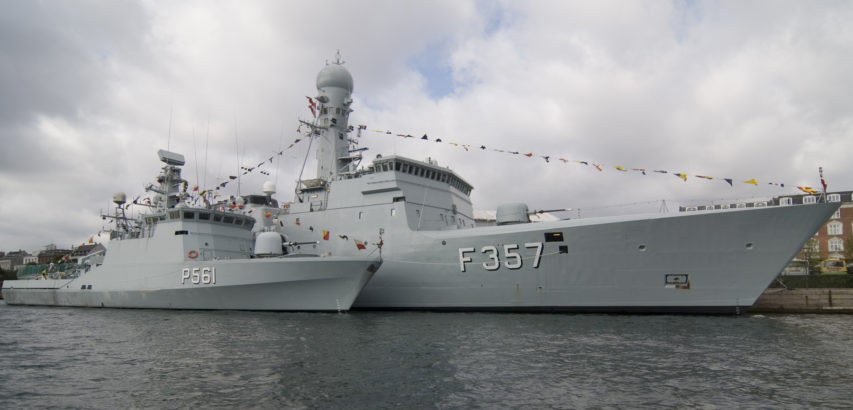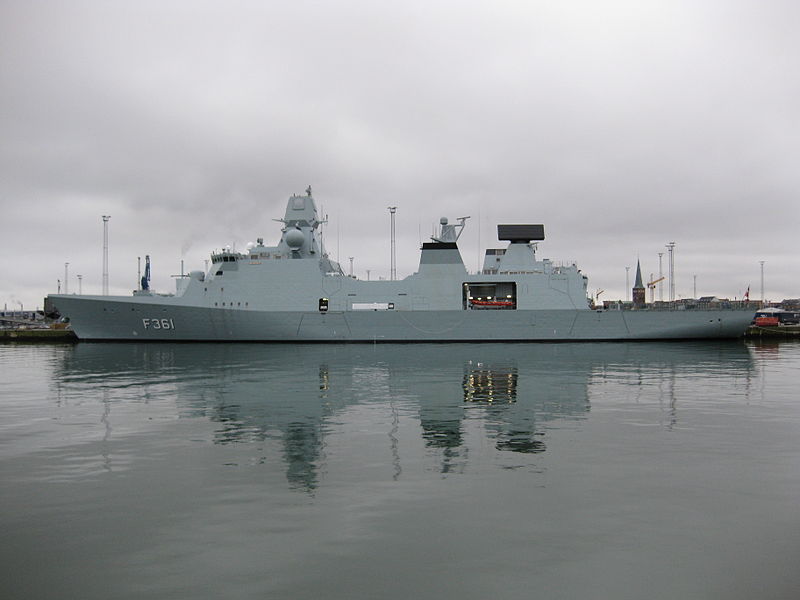Published on 4 Jul 2015
First ever episode of History Buffs. A film review show dedicated only to reviewing Historical movies
May 23, 2016
History Buffs: Zulu
QotD: Yachting news
It is pleasing to see a man travelling in style. Erkan Gürsoy, age sixty-eight, took the northern route for his latest visit to his native Turkey, which is usual when flying to the Old World from British Columbia. But he gave this a twist by avoiding the airlines. Instead he negotiated the Northwest Passage, then crossed the rough Atlantic (weathering a hurricane), in a 36-foot aluminum yacht of his own construction. The Altan Girl, and her master, arrived safely at Çanakkale (near Troy in the Dardanelles), somewhat dimpled by the ice. Polar bears were also among Mr Gürsoy’s perils, as I gather from reports.
Most solo sailors come from inland locations, I have noticed, and this one from the Turkish interior. My theory is that people raised along the coast would know better. My own frankly escapist sailing fantasies owe much to a childhood spent mostly well inland, so that I was fully four years before I’d even seen an ocean. I remember that first encounter vividly. It turned out to be larger than I had expected.
Mr Gürsoy makes his living in Nanaimo manufacturing aluminum boats, mostly as tenders for larger vessels. He calls his stock-in-trade the “non-deflatable” — the hulls ringed around with fat aluminum irrigation tubing. He has a patent on that, and while admitting that his craft are rather ugly, notes that they are hard to sink. (From photographs I see that he is not much into concealing welds, either.) They are also rather noisy, for those riding inside, and they do bounce about on the waves. But on few other ships can one drum so impressively, to discourage those pesky bears, when trapped in ice that is crushing you like a pop can.
Clearly, from the accounts I have read, and by the full Aristotelian definition, a magnificent man.
David Warren, “Yachting news”, Essays in Idleness, 2015-02-11.
May 22, 2016
Point Of No Return – Anti-War-Movements I OUT OF THE TRENCHES
Published on 21 May 2016
Macklemore’s uncle sits in the chair of wisdom again to answer your questions about World War 1. This time we talk about anti war movements, the point of no return and how our team copes with the horrors of war.
Perhaps the US Navy can learn from Denmark on getting the “Little Crappy Ships” right
On the National Interest Blog, James Hasik points out that the idea of the Littoral Combat Ships of the US Navy was successfully implemented more than twenty years ago (and much more economically, too):
In contrast, we know it’s possible to get modularity right, because the Royal Danish Navy has been getting it right since the early 1990s. Way back in 1985, Danyard laid down the Flyvefisken (Flying Fish), the first of a class of 14 patrol vessels. The ships were intended to fight the Warsaw Pact on the Baltic — a sea littoral throughout, with an average depth of 180 feet, and a width nowhere greater than 120 miles. Any navy on its waters might find itself fighting surface ships, diesel submarines, rapidly ingressing aircraft, and sea mines in close order. On the budget of a country of fewer than six million people, the Danes figured that they should maximize the utility of any given ship. That meant standardizing a system of modules for flexible mission assignment. The result was the Stanflex modular payload system.
At 450 tons full load, a Flyvefisken is much smaller than a Freedom (3900 tons) or an Independence (3100 tons). Her complement is much smaller too: 19 to 29, depending on the role. At not more than 15 tons, the Stanflex modules are also smaller than the particular system designed anew for the LCSs. But a Flyvefisken came with four such slots (one forward, three aft), and a range of modules surprisingly broad […]
Swapping modules pier-side requires a few hours and a 15-ton crane. Truing the gun module takes some hours longer. Retraining the crew is another matter, but modular specialists can be swapped too. The concept has had some staying power. The Flyvefiskens served Denmark as recently as 2010. In a commercial vote of confidence, the Lithuanian Navy bought three secondhand, and the Portuguese Navy four (as well as a fifth for spare parts). Over time, the Royal Danish Navy has provided Stanflex slots and modules to all its subsequent ships: the former Niels Juel-class corvettes, the Thetis-class frigates, the Knud Rasmussen-class patrol ships, the well-regarded Absalon-class command-and-support ships, and the new Ivar Huitfeldt-class frigates.
Flyvefisken-class patrol ship HDMS Skaden (hull number P561) and HDMS Thetis (F357) in Copenhagen (via WikiMedia)
In short, 25 years ago the Danes figured out how a single ship could hunt and kill mines, submarines and surface ships. A small ship can’t do all those things well at once, but that’s a choice in fleet architecture. Whatever we think of the LCS program, we shouldn’t draw the wrong lessons from it. Why is this important? Modularity is economical, as the Danes have long known. Critically, modularity also lends flexibility in recovering from wartime surprise, in that platforms can be readily provided new payloads without starting from scratch. Because on December the 8th, when you need a face-punched plan, you’d rather be building new boxes than new whole new ships.
Wikipedia has this image of the HDMS Iver Huitfeldt:
QotD: Western suicidalism
The most important weapons of al-Qaeda and the rest of the Islamist terror network are the suicide bomber and the suicide thinker. The suicide bomber is typically a Muslim fanatic whose mission it is to spread terror; the suicide thinker is typically a Western academic or journalist or politician whose mission it is to destroy the West’s will to resist not just terrorism but any ideological challenge at all.
But al-Qaeda didn’t create the ugly streak of nihilism and self-loathing that afflicts too many Western intellectuals. Nor, I believe, is it a natural development. It was brought to us by Department V of the KGB, which was charged during the Cold War with conducting memetic warfare that would destroy the will of the West’s intelligentsia to resist a Communist takeover. This they did with such magnificent effect that the infection outlasted the Soviet Union itself and remains a pervasive disease of contemporary Western intellectual life.
Consider the following propositions:
- There is no truth, only competing agendas.
- All Western (and especially American) claims to moral superiority over Communism/Fascism/Islam are vitiated by the West’s history of racism and colonialism.
- There are no objective standards by which we may judge one culture to be better than another. Anyone who claims that there are such standards is an evil oppressor.
- The prosperity of the West is built on ruthless exploitation of the Third World; therefore Westerners actually deserve to be impoverished and miserable.
- Crime is the fault of society, not the individual criminal. Poor criminals are entitled to what they take. Submitting to criminal predation is more virtuous than resisting it.
- The poor are victims. Criminals are victims. And only victims are virtuous. Therefore only the poor and criminals are virtuous. (Rich people can borrow some virtue by identifying with poor people and criminals.)
- For a virtuous person, violence and war are never justified. It is always better to be a victim than to fight, or even to defend oneself. But “oppressed” people are allowed to use violence anyway; they are merely reflecting the evil of their oppressors.
- When confronted with terror, the only moral course for a Westerner is to apologize for past sins, understand the terrorist’s point of view, and make concessions.
These ideas travel under many labels: postmodernism, nihilism, multiculturalism, Third-World-ism, pacifism, “political correctness” to name just a few. It is time to recognize them for what they are, and call them by their right name: suicidalism.
Trace any of these back far enough (e.g. to the period between 1930 and 1950 when Department V was at its most effective) and you’ll find a Stalinist at the bottom. Among the more notorious examples are: Paul de Man — racist and Nazi propagandist turned Stalinist, and founder of postmodernism; Jean-Paul Sarte, who described the effects of Stalinism as “humane terror” and helped invent existentialism; and Paul Baran, who developed the thesis that capitalism depended on the immiseration of the Third World after Marx’s immiseration of the proletariat failed to materialize.
Al-Qaeda didn’t launch any of these memes into the noosphere, but it relies on them for political cover. They have another effect as well: when Islamists characterize the West as “decadent”, and aver that it is waiting to collapse in on itself at the touch of jihad, they are describing quite correctly and accurately the effects of Western suicidalism.
Stalinist agitprop created Western suicidalism by successfully building on the Christian idea that self-sacrifice (and even self-loathing) are the primary indicators of virtue. In this way of thinking, when we surrender our well-being to others we store up grace in Heaven that is far more important than the momentary discomfort of submitting to criminals, predatory governments, and terrorists.
Eric S. Raymond, “Suicidalism”, Armed and Dangerous, 2005-09-13.
May 21, 2016
Suleiman the Magnificent – Lies – Extra History
Published on 23 Apr 2016
Suleiman lost faith in those who surrounded him, fearing that they schemed to replace him. Why do we so rarely see such destructive suspicion in our governments today? We also need to talk about what made the West dub Suleiman “Magnificent,” and the flourishing of arts and education which took place under his reign.
Towards the end of his reign, Suleiman saw his once trusted advisor, Ibrahim Pasha, and his own son, Mustafa, as enemies rather than allies. He feared that they would displace him to put Mustafa on the throne. Why don’t we see such distrust turn into murder in our governments today, when it was such a common trope in the ancient world? Perhaps it’s because our modern governments provide a regular means of succession, so that anyone with ambition is usually better served waiting for their turn rather than trying to take on the entire government.
The series was too short to allow us to give Suleiman’s reign the coverage it really deserved, but we want to take advantage of this opportunity to talk about why the West dubbed him “Suleiman the Magnificent” and his people called him “The Lawgiver.” The laws he put so much effort into rewriting improved equality in the society, including creating additional protections for Christians and Jews within his Muslim empire. He was also a patron of the arts, and even a poet himself, under whose reign a distinctive Ottoman style developed and many beautiful buildings were constructed. Finally, as a leader of armies, he took many cities that were considered the bulwark of European defense against the Ottomans, and though he had huge armies to do it, many huge armies had failed at those tasks before since the cities were heavily fortified and actually had the odds stacked in their own favor.
QotD: Teaching Shakespeare
I have the grimmest memories of being taught Shakespeare. It happened in a high school in Ontario in the ’sixties. I’m sure that my teacher meant well. It was on the curriculum, and what could she do? It started with Romeo and Juliet, in connexion with which we were taken to see a movie. This was also called “Romeo and Juliet,” directed by Franco Zeffirelli, and starring Leonard Whiting and Olivia Hussey. Tell the truth, I fell in love with the actress — for hours; days maybe. But then I’ve always been a fool for women. We were taught not the play, but the movie; then as we moved on to The Merchant of Venice (I think it was, I wasn’t paying much attention) we were taught not the play, but “what it all means.” I can only bear that when the teacher has some notion of what it all might mean, herself.
My interest focused curiously enough not on Romeo, nor Juliet, nor any of the powers at play in Verona, but on Friar Laurence, and his charitable if somewhat naive efforts to prevent bad things from happening. Shakespeare here and elsewhere had the nerve to present Catholic monks and nuns in a good light, after they’d been scoured from the English landscape. Pay attention, and know anything at all about his times, and one will see that he has consistently reversed the “stereotypes” promoted in Elizabethan England. There, as here today, the traditional practitioners of religion were satirized for corruption and hypocrisy. In Shakespeare, instead, the monks and nuns scramble about trying to fix one mess or another that the worldlings have created for themselves, and somehow reconcile them with Our Lord. We see plainly who the real Christians are, and who are not. And if we want real hypocrisy and corruption — we find for instance Angelo, in Measure for Measure, with his parade of fake asceticism, and lines to echo those of contemporary “reformers.”
I mention that play as extremely topical, in light of recent events at Rome. Also, because it was once taught to me as an exposé of religious life, when it is — shriekingly — the opposite.
But by that point in my life (age fourteen) I was already a Shakespeare votary, and no high school teacher could kill my enthusiasm for him, much as she might (unwittingly) kill it in everyone else, by making a drudgery of the subject. The basic clew was missing among the pedagogues, as it still is: that this subject teaches itself. It needs only a stage, only to be pronounced, for the “music” in verse and prose to begin explaining all the words. The less prepared a student is to resist Shakespeare, the faster he will succumb to the charm. This has been tested: even before audiences in India with little knowledge of English in any dialect; or in Germany a long time ago, where English strolling players took Shakespeare when London theatres had been closed. The story of Shakespeare’s conquests, in English and a hundred other languages, is one the English themselves have hardly understood, and exhibits to my mind the truth of Kipling’s: “What do they know of England, who only England know?”
David Warren, “Teaching Shakespeare”, Essays in Idleness, 2015-01-19.
May 20, 2016
Conrad’s Cunning Plan – Hiding In Plain Sight I THE GREAT WAR Week 95
Published on 19 May 2016
Austro-Hungarian Chief of Staff Conrad von Hötzendorf had a plan to finally force a decision against the Italians. He massed troops and artillery in a different sector of the front planning a surprise offensive. And even though everybody knew about his cunning plan, Italian Chief of Staff Luigi Cadorna believed everything was a ruse and fired a general instead of preparing against the attack.
A reporter with the Lorne Scots at Meaford
My old regiment gets a bit of media attention, this time from the Orangeville Banner, as Chris Vernon goes along on a spring weekend exercise with the Lorne Scots:
As my handler Lorne Scot Master Corporal Christopher Banks drove through the gates of the 4th Canadian Division Training Centre, I was overcome with a familiar anxiety.
The centre, known by soldiers simply as Meaford, is approximately 17,500 acres of dense bush, limestone cliffs, open meadows, a lake and 22 kilometres of Georgian Bay shoreline. I spent two months here for basic training in the summer of 2005 and at age 35, I believe I was the second oldest recruit.
Soldiers in 32 Brigade Group complete their basic training at Meaford, other career courses and perform several weekend exercises on the base throughout the year, and every fresh-faced private in 32 Brigade knows the anxiety I felt, even now as a civilian, as Banks drove us through the gate.
You see, there is a certain “suckage factor” to Meaford.
“Welcome to the Meaford weather machine,” said Banks, an inside reference among soldiers that refers to the fact that it can be sunny on one side of the base while on the other side it can rain for hours while you are out on a foot patrol.
There’s also poison ivy, a rumoured ghost, mosquitos, and large ruts left in the ground from the 1940s when the army used the base as a tank range. These ruts have sent many recruits home with broken and sprained ankles, not to mention broken dreams, as the injured troop will have to wait till next year to complete basic training.
Headquartered in Toronto, 32 Brigade Group is mostly an infantry brigade consisting of more than 2,400 soldiers in 12 reserve units based in Toronto, Aurora, Barrie, Brampton, Georgetown, Oakville, Mississauga, Owen Sound, Brantford, Simcoe, St. Catharines and CFB Borden. It also has two reconnaissance regiments, two field artillery regiments, a field engineer regiment, six infantry battalions and a communication (signals) unit.
Banks, who did tours in Afghanistan and Bosnia, drives us down a pothole-riddled dirt road. I recognize the road. It’s where I jogged every day between seven and 10 kilometres at 5 a.m. while on basic training.
Banks is taking me to a Forward Operating Base (FOB) where approximately 266 infantry reservists are camped out.
“We are doing raids. Offensive training. When they (soldiers) arrived last night there was no rest. We pushed them across that line of departure at 5 a.m.,” said Lieutenant Colonel Bruce Mair from inside a command post tent where officers are milling about and looking over maps.
Reservists are part-time soldiers who serve generally one night a week, one weekend a month and a few weeks in the summer. Mair has been a reservist for 29 years and in the civilian world serves as a police officer.
Reserve units primarily respond to domestic situations, like ice storms or blackouts. However, they are trained for combat and many members have gone overseas to serve with the regular force in Bosnia and Afghanistan.
QotD: The law and the US constitution
Laws are no longer made by a rational process of public discussion; they are made by a process of blackmail and intimidation, and they are executed in the same manner. The typical lawmaker of today is a man wholly devoid of principle — a mere counter in a grotesque and knavish game. If the right pressure could be applied to him, he would be cheerfully in favor of polygamy, astrology or cannibalism.
It is the aim of the Bill of Rights, if it has any remaining aim at all, to curb such prehensile gentry. Its function is to set a limitation upon their power to harry and oppress us to their own private profit. The Fathers, in framing it, did not have powerful minorities in mind; what they sought to hobble was simply the majority. But that is a detail. The important thing is that the Bill of Rights sets forth, in the plainest of plain language, the limits beyond which even legislatures may not go. The Supreme Court, in Marbury v. Madison, decided that it was bound to execute that intent, and for a hundred years that doctrine remained the corner-stone of American constitutional law.
H.L. Mencken, The American Mercury, 1930-05.
May 19, 2016
Hundstalag 1 – the canine Hogan’s Heroes prison camp
We got a lovely new fence installed recently, so we could allow the dogs to roam around the new backyard without needing to worry that they got off the property. In the interim, before the ground warmed up enough to let the fence contractor dig the post holes, we rented some temporary fence panels and had them set up to close off the gap between the house and the garage, creating a small “courtyard” where the dogs were allowed to wander. The new fence was complete at the end of last week, and the rental company picked up the temporary fence on Tuesday.

The temporary fence
This meant that the dogs have been free to roam the full backyard for just about 48 hours.
In that short time, we’ve had three prison breaks.
Now let me emphasize that this is an excellent fence and that we’re overall very happy with the contractor’s work. But as with any defensive fortification, there are weak spots. The gates, for example, are traditional weaknesses, and breakout number two happened when an electrician opened the gate to ask me a question and both dogs bolted past him and out toward the main street.
Breakouts number one and three were tunnelling jobs.
When the fence contractor finished, I had a walk-around the perimeter with one of the workmen specifically looking for spots where an agile and eager dog could manage to squeeze under the bottom of the fence. We found four such locations and additional measures were taken to close them off.
Despite those measures, we discovered that a Corgi-mix dog can be a very energetic digger:

The escape tunnel, cunningly concealed behind a screen of cedar bushes and the trunk of a tree
Additional measures had to be taken, and given that it’s effectively invisible from most of the backyard, brute concrete was considered the most appropriate fix:

We’re hoping this is sufficient discouragement to keep the canines inside the boundary fence…
Suleiman the Magnificent – VI: Custodian of the Two Holy Mosques – Extra History
Published on 16 Apr 2016
Suleiman’s decisions came back to haunt him, starting with the Knights of Malta (once Rhodes). He tried to kick them off their island again, but failed. He launched a new campaign to take Vienna and prove the might of his empire. But he was so old…
A messenger disrupted Suleiman in his reverie. He brought news from Malta…
Suleiman had outlived both his friends and his rivals. Charles V had passed, but his throne had passed to a son who proved just as vexing. An ardent Catholic, Philip II set his ships to harass Ottoman fleets in the Mediterranean and emboldened others to dispute Suleiman’s mastery of the sea. The Knights of Malta, whom Suleiman had defeated at Rhodes and allowed to leave peacefully, once again gave safe habor to these Christian ships. Suleiman sent a force to take their island, but his commanders argued with each other and Christian Europe united against him in a way that it could not when he’d been a younger man. The Knights Hospitallier withdrew into their forts. His army struggled for three weeks to take just one of them, and although they succeeded, Suleiman’s commander died and the Christian reinforcements had time to join the remaining two forts. At last, faced with yet another fleet of reinforcements, Suleiman’s commanders decided to withdraw.
Back in his garden, Suleiman knew that this defeat would destroy the invincible image of his empire. He resolved to prove that the Turks were still a force to be feared, and organized a campaign to take Vienna. He would lead them himself. They left in 1566 with great fanfare, but they were immediately greeted by torrential rains that slowed their advance and cost them materiel. Suleiman spent the whole trip confined to a carriage, and when they finally arrived to siege Szeged, he had to retreat a sickbed in his tent. He died while the battle still raged outside, never to know his empire’s fate.
QotD: A contrarian view of “Britain in decline”
… it is not a bad time to remind ourselves how lucky we are to live on this damp little island.
I don’t mean this in a jingoistic way, and certainly when you look closely there is little to recommend Henry V’s brutal French raid. What there is to celebrate, of course, is Shakespeare’s poetic rendering of the campaign. It is our literary, scientific, technological, economic, political and philosophical achievements, rather than just our military milestones that we should occasionally pause to remember, amid our usual self-criticism.
All my life I have been told that Britain is in decline. But stand back and take a long, hard look. Even by relative standards, it just is not true. We have recently overtaken France (again) as the fifth largest economy in the world and are closing on Germany. We have the fourth largest defence budget in the world, devoted largely to peace-keeping. We disproportionately contribute to the world’s literature, art, music, technology and science.
We have won some 123 Nobel prizes, more than any other country bar America (and more per capita than America), and we continue to win them, with 18 in this century so far. In the field of genetics, which I know best, we discovered the structure of DNA, invented DNA fingerprinting, pioneered cloning and contributed 40 per cent of the first sequencing of the human genome.
On absolute measures, we are in even better shape. Income per capita has more than doubled since 1965 — in real terms. In those days, three million households lacked or shared an inside lavatory, most houses did not have central heating and twice as many people as today had no access to a car. When they did it was expensive, unreliable and leaked fumes.
In the 1960s even though there were fewer people in Britain, rivers were more polluted, the air was dirtier, and there were fewer trees, otters and buzzards. Budget airlines, mobile phones, search engines and social media were as unimaginable as unicorns. Sure, there was less obesity and fewer traffic jams, but there were more strikes, racism and nylon clothing. People spent twice as much of their income on food. There may be political angst about immigrants, but Britain is far more at ease with its multicultural self today than we might have dared to hope in the 1960s.
Matt Ridley, “Britain’s Best Years”, MattRidley.com, 2015-01-01.





